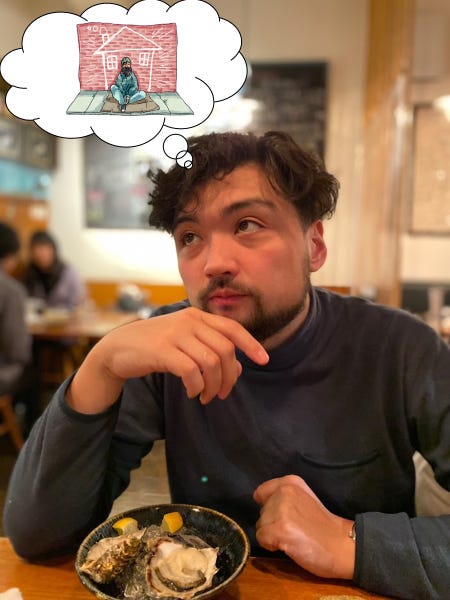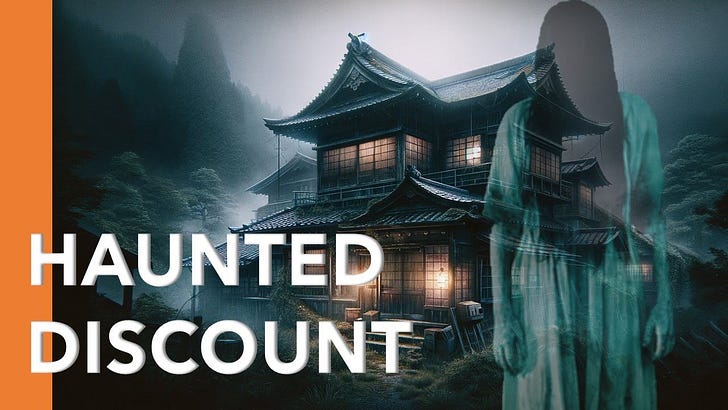As you may know, I have worked hard for a couple of weeks to produce these two articles:
After publishing them, the question I got asked the most was:
“Do you think buying Japanese real estate is a good investment?”
To tell you the truth, I'm actually super torn.
When collecting data for my first article on three reasons for buying real estate in Japan, I was super positive: It's undeniable that the Japanese real estate market is very cheap for such a high income country. The fact that housing prices have grown rapidly in the past years, especially in many major cities and tourist hot-spots, is an even stronger argument that now might be the time to buy.
However, when writing my article on three reasons for not buying real estate in Japan, my positiveness shriveled up quickly. Even though the data still clearly indicate that it’s an undervalued property market, the arguments against investing are still looming large: An aging population, a hot-spot for natural disasters and the Japanese asset bubble from 1992 still stuck in people’s minds. The vivid picture these negative arguments paints are just so strong it doesn’t matter what the data says…
Comparing the Japanese real estate market to stocks, I felt that it could be closely aligned to a tobacco company: These companies produce great cash flow, give out higher-than-average dividends and are very undervalued, but people still do not want to touch it because of the stigma surrounding them.
Of course, Japanese real estate does not give people cancer, for the most part, and hence this stigma can quickly change to “euphoria”, but as of now it’s still hard to recommend Japanese properties outright.
My thoughts on how you should invest in Japanese real estate
Firstly, I think that if you live here and is focused on the return on investment, the best real estate purchase you can do is to buy a property in a tourist hot-spot that you want to use and can rent out during high-seasons.
Sure, monetarily is not as attractive as renting out a place full time, but people are willing to pay a lot of money for a place to stay during Golden Week and other long weekends! This coupled with the indications that as many people want to travel to Japan when restrictions are lifted as in 2019 shows that many cheap properties in tourist spots are potential gold mines.
There is a big but here: the paperwork required to rent out real estate in Japan is gruesome. Since June 15, 2018, regulations called the “Minpaku” Law came into effect, requiring even Airbnb hosts in Japan to register and other administrative procedures. The main rules are that the property must be registered with local government authorities, guest details by way of official ID must be collected by the host, and the property can only be rented out for a maximum of 180 days a year. More detailed rules below:

As a second option, I do believe that if you intend to stay in Japan long-term, buying real estate to live in is also a good investment. People who have ever rented a place in Japan are all too familiar with key-money (a mandatory “gift” to the property owner of around 1-2 months rent), exorbitant cleaning fees and contract update fees (usually 1 month’s extra rent every 2-years the rent contract is updated).
If you buy a property, you still do have to pay initial stamp duty fees, brokerage fees and some recurring taxes, but in the long run it’s a heck of a lot cheaper than the fees connected to renting. Also, even in this high-inflation environment, it’s still fairly easy to get a loan with a very low interest rate. On top of that, property-loans in Japan comes with a so called “home loan tax deduction” that allows you to deduct 1% of your remaining home loan from your income tax each year for up to 10 years.
However, the rents for Japanese properties, even in Tokyo, are relatively cheap. Per square meter, they can look a bit expensive, but I promise you that the Japanese are experts at space allocation and an apartment of let’s say 30 square-meters feels almost twice as big in Japan as for example in the US. Even per square meter, major cities in Japan are often cheaper than their foreign peers. Also, if you rent and an earthquake, tsunami or typhoon wrecks your home, you’re basically scot-free (if you’re not injured of course) and can just move to a new place.
Lastly, investing from abroad might not be a bad option if you have an agent in Japan that you trust that can take care of all the local paperwork, checks and requirements. However, I'd consider just buying land instead, as it is not exposed to the high depreciation of property prices here.
“Is investing in real estate bad for the locals?”
Another question, or rather critique I should say, I got multiple times while publishing these article were that any foreign investment in real estate in Japan would lead to locals being priced out of their own neighborhood.
I do sympathize with this criticism. In many cities around the world, foreign investments drive up the prices to unsustainable levels and price-out many locals who have lived there for decades and often made it to the attractive place that foreigners want to buy. You probably heard of the exodus of creatives from places like San Francisco, Berlin, or even New York. Instead, these places gets filled up with bankers, tech millionaires and sometimes even people who have no intention to let anyone live in their properties, but just buy them to store their money somewhere.
However, I think the impact you have with your real estate investment depends on your intentions. If you buy a property in rural Japan (which thanks to Japan's amazing train network can be as little as 1h from a major city). Even if it's for investment purposes, I think you would do a huge service to the community. Many municipalities are experiencing serious population decline and don't have enough tax revenues to pay for public services. If you live in the property, or even intend to rent it out, you'll pay taxes to the community and bring in more business.
Even investments in major tourist spots or cities can be good for the locals. For example, Chinese and Australian real estate developers have poured in money in many Japanese ski destinations (most notably Niseko) and invested massively in new ski resorts, hotels etc. Sure, it raised prices for the locals, but created many new jobs and other wealth in the process. The Japanese government is actually looking to replicate the success in Niseko in many other parts of the Japan that are suffering from depopulation.
Real estate investments that hurt the locals are the ones that are used as vehicles to park your money in. These investment are often focused on buying properties or land with no intention to utilize it. They create an artificial shortage of land and houses and raise the prices on the rest of the housing stock.
We're seeing a lot of this in cities like Hong Kong, London and New York, and it's one of the biggest reasons to why property prices there are so astronomically high. So far, Japan has been relatively spared from these kinds of investments, but a higher interest in properties here could definitely bring more investors like that here too.
Concluding thoughts
I do believe buying Japanese real estate is a a good investment, especially if you live here and invest in a second home in a tourist hot-spot to rent out during tourist-seasons. However, in the long-term (around 20 years+) I think that the overall structural problem Japan is battling with, most notably the declining birth-rate, will grow so large that it will inevitably depreciate the Japanese housing market.
With that said, it’s impossible to predict what the future holds for any country, let alone Japan, so if you’re looking to invest in Japanese property today, now might be the best time to strike!

















Share this post